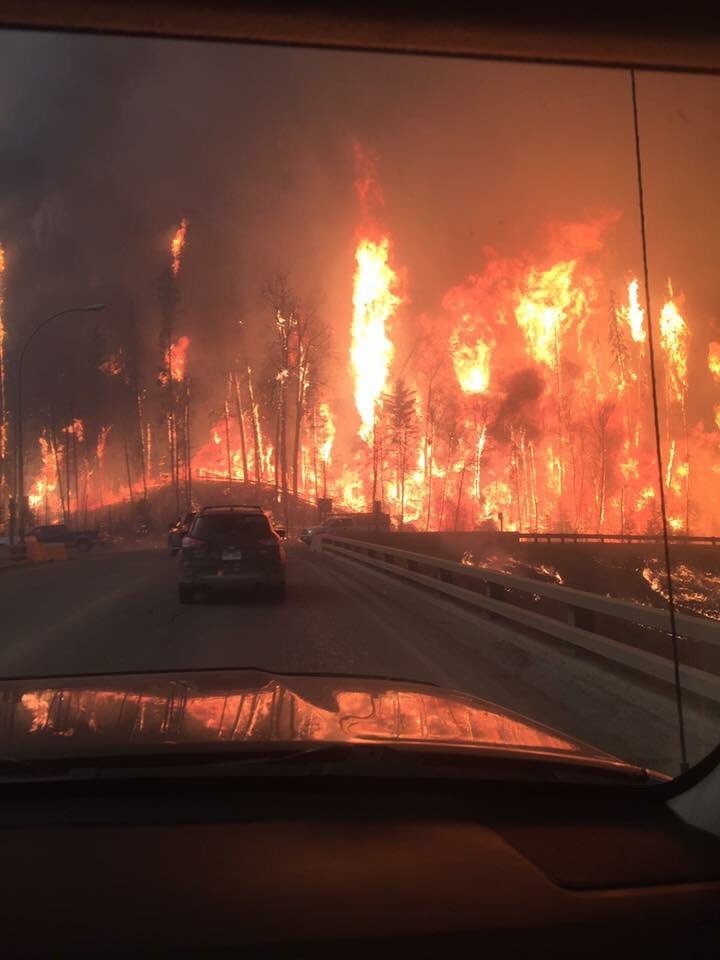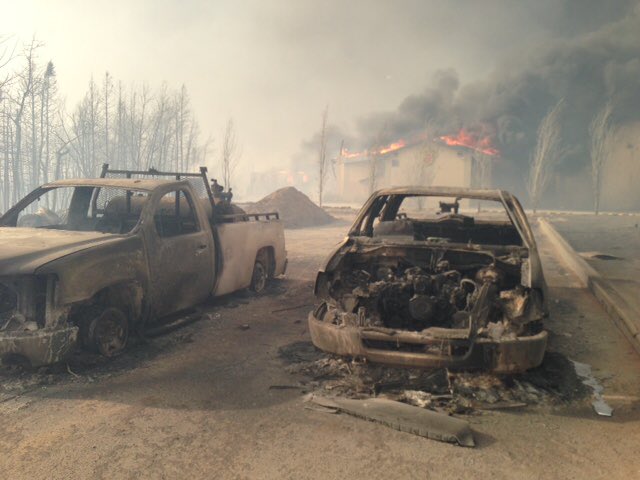Published: May 4,2016
"We need to get through the day here, until we get to about seven or eight o'clock at night, and we'll have a better indication of where things stand," Chad Morrison, Alberta's senior manager of wildfire prevention, told CBC. "If we can get through tonight, I think we'll have a day tomorrow where we might have continued success."
(MORE: Why It's Called the #YMMfire and Other Questions Answered)
Some 88,000 people were forced to leave Tuesday evening as the fire quickly spread, putting homes, schools, businesses and lives in danger, according to the Globe and Mail. Officials were calling it the biggest wildfire evacuation in terms of people displaced in Canadian history.
Local officials said Wednesday that 70 percent of the homes in Beacon Hill have been lost, and the most recent census said the neighborhood is home to 2,200 residents living in more than 700 dwellings.
At a Wednesday morning briefing, Alberta Premier Rachel Notley said the fire had grown to about 25,000 acres, and 1,600 structures had been destroyed in Canada's main oil sands city. So far, no serious injuries or deaths have been reported from the devastating blaze.
"We were not told to evacuate when we left. We could hear the flames across the road. We never waited to be told to leave," said Fort McMurray resident Jason Edmonson. "It felt like we had no other choice but to go. It was like living in a movie. So surreal. We lost everything, including two cats. No insurance, no time to think clearly. I'm very thankful that myself and my friends and family are safe. The city, police, firemen and everyone else who helped were amazing. Including nearby towns."
As residents scattered to escape the flames, even the evacuation routes were dangerous as the fast-moving inferno burned along the roadways. For thousands, just getting out of the area was a challenge.
"It was scary because you didn't know what was on the other side. There was a point where I couldn't see a foot in front of my vehicle. I didn't know what was in front of me, you just had to take that chance to get out."
On Wednesday, assistance began to arrive. Several provinces pledged to send fire crews to help fight the inferno, and evacuees whose vehicles ran out of gas were having their vehicles refueled by emergency crews as well.
(MORE: 2015 Was a Record Wildfire Season for the U.S.)
Fort McMurray shattered a 71-year-old daily record high, hitting 90 degrees. The old record for May 3 was 82 degrees, according to the Government of Canada. The average high temperature for this location is in the upper 50s for early May, according to weather.com meteorologist Tom Moore.
With reinforcements arriving Wednesday, over 200 firefighters were on scene fighting the massive blaze, according to the AP.
A pic of what trying to leave Fort McMurray looks like right now
"It's chaos on the roads. People are panicking. It's gridlock on the roads. Flames are right next to a gas station," said Carina Van Heerde.
Helicopters were being used to douse the flames but have since stopped with the fire coming so close to the city, according to the Edmonton Journal.
(MORE: Is Climate Change Making Wildfire Seasons Worse?)
The Regional Municipality of Wood Buffalo asked that those who were evacuated head to MacDonald Island Park, where an evacuee reception is set up, Global News reported. There were also reports that some families were split up along evacuation lines and had to reunite in shelters after escaping the flames.
"Pulling into the rest stops and seeing families coming together after leaving Fort McMurray – they didn't know if each other were alive," said Flett. "Just the tears, happy tears obviously, but sad at the same time. Happy to know that they ran into a family member. It's so emotional because you don't know, you don't have a clue until you get to see a family member if they're actually alive or not, or did they make it out."
Destruction around Fort Mac Super 8 Motel. Photo by @GlobalCalgary cameraman Loren Andreae #ymmfire
Babies Born in Evacuation Camp
Two women gave birth to babies in a work camp used to house evacuees north of Fort McMurray, according to CBC. The newborns are doing fine, the report added, and leaders at the evacuation site said the births boosted morale at the camp."We've had two babies born on our site so far," Blaire McCalla, communications manager with a company that provides housing for oilfield workers, told CBC. "Can't say that ever happened before."
This is a developing story; please check back frequently for updates.




No comments:
Post a Comment